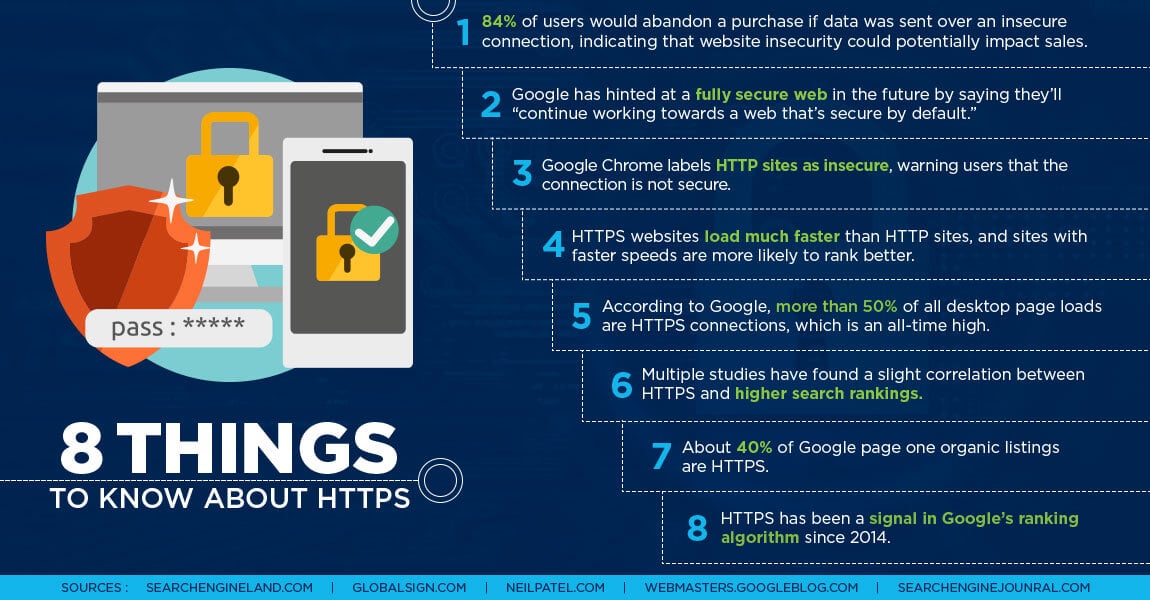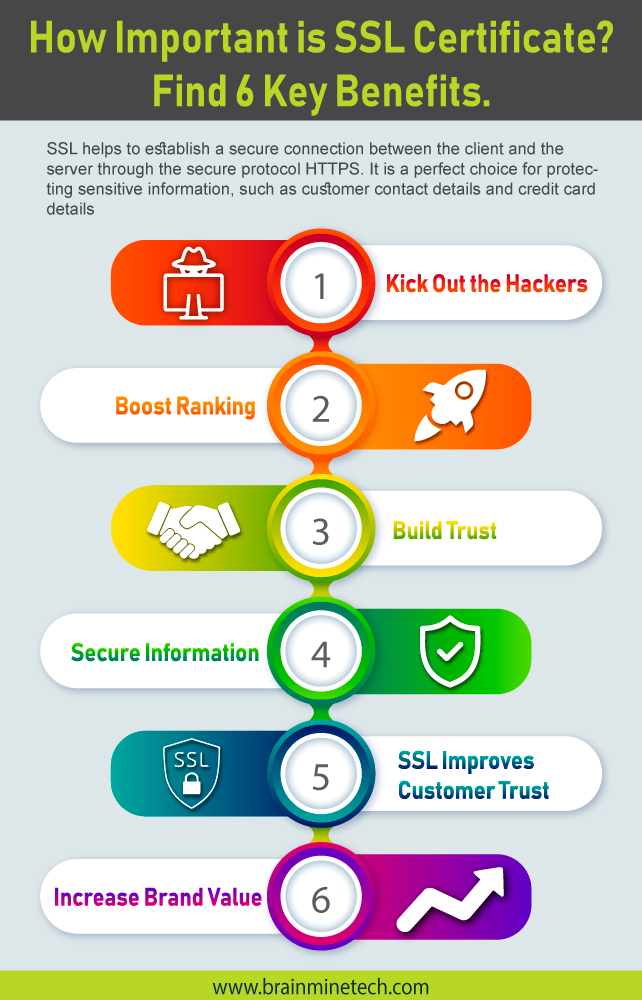Unlock the secrets of HTTPS: Learn how this secure protocol boosts your website’s security and improves SEO rankings now!

Image courtesy of via DALL-E 3
Table of Contents
Introduction to HTTPS
When you connect to websites on the internet, you may have noticed a little ‘lock’ symbol next to the web address. This indicates that the website is using a secure way of transmitting data called HTTPS. But what exactly is HTTPS, and why is it important? Let’s find out.
What Does HTTPS Stand For?
HTTPS stands for HyperText Transfer Protocol Secure, and the ‘Secure’ part is crucial. It signifies that the connection between your device and the website is encrypted, making it difficult for anyone to intercept and read the information being sent back and forth.
Why is HTTPS Important?
Having a secure connection with websites is vital for both users and the websites themselves. For users, it means that any personal information you enter on a website, such as passwords or credit card details, is protected from falling into the wrong hands. For websites, using HTTPS can help build trust with visitors and protect the integrity of the site.
How HTTPS Works
When you surf the internet, have you ever wondered how your information stays safe and secure from prying eyes? That’s where HTTPS comes in! Let’s dive into how HTTPS works to keep your data protected.
Understanding Encryption
Encryption may sound like a fancy term, but it’s actually quite simple. Think of encryption as a secret code that only you and the website you’re visiting can understand. When you use HTTPS, your data gets scrambled into this secret code before it’s sent over the internet. This means that even if someone tries to intercept your information, they won’t be able to make sense of it without the key to unlock the code.
Role of SSL/TLS Certificates
SSL stands for Secure Sockets Layer, while TLS stands for Transport Layer Security. These certificates are like the secret handshake between your browser and the website you’re visiting. When a website has an SSL or TLS certificate, it means that your connection to that site is secure. These certificates not only help to encrypt your data but also verify that you’re actually communicating with the right website and not a fake one trying to steal your information.
Security Benefits of HTTPS
When it comes to internet security, HTTPS offers various advantages that are crucial for both websites and users. Let’s delve into the security benefits of using HTTPS:

Image courtesy of www.impactmybiz.com via Google Images
Protection from Hackers
HTTPS plays a vital role in safeguarding sensitive information from cybercriminals. By encrypting data transmitted between a user’s browser and the website’s server, HTTPS makes it incredibly difficult for hackers to intercept and decipher this data. This encryption ensures that even if hackers manage to intercept the data, they won’t be able to make sense of it without the decryption key, keeping user information safe and secure.
Ensuring User Privacy
One of the significant advantages of HTTPS is ensuring user privacy. When a website employs HTTPS, all communication between the user’s browser and the website is encrypted, preventing unauthorized parties from eavesdropping on sensitive information such as login credentials, payment details, and personal data. This added layer of security instills confidence in users, assuring them that their information is protected and private while browsing or interacting with the website.
SEO Benefits of HTTPS
When it comes to increasing the visibility of a website on search engines, HTTPS plays a crucial role. Let’s delve into how using HTTPS can enhance a website’s ranking and attract more visitors.
Better Google Rankings
One significant advantage of switching to HTTPS is the positive impact it can have on a website’s ranking in Google search results. Google’s algorithm considers the security of a website as a ranking factor. Websites that use HTTPS are favored over those that don’t, giving them an edge in the competitive world of search engine optimization (SEO). So, by implementing HTTPS, a website can climb higher in search results, making it more likely to be seen by users searching for relevant content.
Increased Website Traffic
Having a secure website with HTTPS can also attract more visitors. Users tend to trust websites that display the padlock icon and have URLs starting with ‘https://’. When visitors feel confident that their data is safe and their privacy is protected, they are more likely to engage with the website and explore its content. This trust can lead to increased website traffic, as users are more inclined to stay longer on a secure website and return for future visits.
Enabling HTTPS on Your Website
Securing your website with HTTPS is essential for protecting your data and ensuring a safe browsing experience for your users. Here’s a simple guide on how to enable HTTPS on your website.

Image courtesy of www.bluecorona.com via Google Images
Getting an SSL Certificate
To enable HTTPS on your website, the first step is to get an SSL certificate. An SSL certificate encrypts the data exchanged between your website and its visitors, making it secure. You can obtain an SSL certificate from a trusted provider or your web hosting company.
Configuring Your Website
Once you have obtained the SSL certificate, you need to configure your website to use HTTPS. This involves updating your website settings to use the HTTPS protocol instead of HTTP. Most web hosting services provide easy-to-follow instructions on how to do this, so be sure to check with your hosting provider for specific guidance.
Checking if a Website is Using HTTPS
Ensuring that websites use HTTPS is crucial for maintaining a secure connection while browsing the internet. Here’s how you can quickly check if a website is using HTTPS to protect your information:
Looking for the Padlock
One way to check if a website is using HTTPS is to look for a padlock icon in the address bar of your browser. The padlock signifies that the connection to the website is secure, ensuring that your data is encrypted and protected from potential threats.
Checking the URL
Another indicator of a secure website is the URL itself. Make sure to check if the website’s URL starts with ‘https://’ instead of ‘http://’. The ‘s’ in ‘https’ denotes a secure connection, meaning that any information you input on that website is encrypted and safeguarded.
Common Misconceptions about HTTPS
There are a few common misunderstandings about HTTPS that can lead people to have reservations about using it on their websites. Let’s address these myths and provide the correct information.

Image courtesy of www.brainminetech.com via Google Images
HTTPS Slows Down Websites
One of the most widespread myths about HTTPS is that it makes websites load slower. This misconception stems from the belief that encryption, which is used in HTTPS, adds extra processing time and slows down data transfers. However, this is not entirely accurate. While it’s true that encryption adds a slight overhead to the data transfer process, modern encryption protocols are highly optimized for speed. In fact, the difference in loading times between HTTP and HTTPS websites is often negligible and outweighed by the security benefits HTTPS provides.
HTTPS is Only for Big Websites
Some people believe that HTTPS is only necessary for large, high-traffic websites, and that small websites or personal blogs don’t need it. This is a common misconception that can put smaller websites at risk. The truth is that HTTPS is important for all websites, regardless of their size or the amount of traffic they receive. Every website that handles sensitive information, such as login credentials or payment details, should use HTTPS to ensure the protection of this data. Additionally, search engines like Google now prioritize secure websites in their rankings, meaning that even small websites can benefit from implementing HTTPS.
Future of HTTPS
As the internet continues to evolve, more and more websites are recognizing the importance of adopting HTTPS. This trend is driven by the growing awareness of internet security threats and the need to protect user data. Websites that implement HTTPS not only provide a secure browsing experience for their visitors but also gain trust and credibility in the online world.
Advancements in Security
The future of HTTPS looks promising with ongoing advancements in internet security technology. Innovations in encryption protocols and certificate management are expected to further strengthen the security of HTTPS connections. These developments will help bolster data protection and privacy, ensuring that users can browse the web with confidence.
FAQs
HTTPS is a vital tool in securing your data online, but it does have its limits. It encrypts the data exchanged between your browser and the website’s server, making it much harder for hackers to intercept and steal. However, HTTPS can’t fully protect all your data once it leaves the website. For instance, if you send an email or use a non-secure app, that information may not be encrypted. So while HTTPS is a strong defense, it’s essential to stay vigilant and use secure platforms for sensitive information.

Image courtesy of paintedbrickdigital.com via Google Images
Is Setting Up HTTPS Expensive?
Setting up HTTPS doesn’t have to break the bank! In the past, SSL certificates, a crucial component of HTTPS, used to be costly. Thankfully, with advancements in technology and increased awareness of online security, you can now find SSL certificates for free or at affordable prices. Many web hosting services even offer free SSL certificates as part of their hosting packages, making it accessible to website owners of all budgets. So, while there may be some costs involved in securing your website with HTTPS, it’s a worthwhile investment in safeguarding your data and building trust with your visitors.
Want to turn these SEO insights into real results? Seorocket is an all-in-one AI SEO solution that uses the power of AI to analyze your competition and craft high-ranking content.
Seorocket offers a suite of powerful tools, including a Keyword Researcher to find the most profitable keywords, an AI Writer to generate unique and Google-friendly content, and an Automatic Publisher to schedule and publish your content directly to your website. Plus, you’ll get real-time performance tracking so you can see exactly what’s working and make adjustments as needed.
Stop just reading about SEO – take action with Seorocket and skyrocket your search rankings today. Sign up for a free trial and see the difference Seorocket can make for your website!
Summary
In conclusion, HTTPS, which stands for HyperText Transfer Protocol Secure, is a crucial aspect of website security and search engine optimization. By enabling HTTPS on a website, users can establish a secure connection that encrypts the data exchanged between their device and the website, protecting it from potential threats like hacking and data theft.
Recap of HTTPS Importance
Ensuring a website uses HTTPS is vital for safeguarding user information, enhancing privacy, and building trust among visitors. Additionally, HTTPS provides a significant SEO advantage, as Google tends to rank HTTPS-enabled websites higher in search results, leading to increased visibility and traffic.







